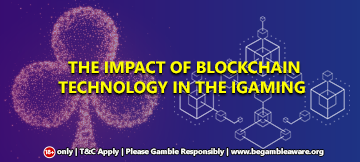
As we all know, the iGaming industry is steadily evolving around the digital world of blockchain technology. To date, the technology is commonly known by the general public for the cryptocurrency Bitcoin, however, blockchain technology brings a far more useful agenda to the table that could potentially be a game-changer for online gambling.
Currently, traditional gaming platforms store sensitive data such as player information and game-play history, together with corporate game technology on their servers. Blockchain technology provides the perfect underpinning for emerging gaming platforms. The desire for faster payments is paving the path for companies to evolve from the traditional payment system through the application of blockchain technology.
Traditional gaming platforms own or control servers that store the game technology, game commands, gameplay history logs, player information, deposit information, and other sensitive information.
Blockchain gaming platforms do not own or control the network hosting much of the sensitive game-related functionality and the information is stored in the blockchain, meaning it's stored on a decentralised network of nodes all acting as code processing and information storage ledgers independent of each other.
Why blockchain technology in igaming?
Blockchain-based iGaming platforms are what could potentially be leading the iGaming industry in the next few years. With the recent acceptance of blockchain-based companies, blockchain technology has gained greater traction amongst online players as they experience what could become the new digital gaming environment.
Blockchain provides numerous advantages to online gaming. Let's have a look at a few of them.
More transparency
With regards to transparency, Blockchain technology ensures that all transactions are recorded in a distributed ledger and can be viewed at any time and are also encrypted, meaning that iGaming companies can maintain clearer records of past transactions with regards to payments, deposits, and withdrawals, making them less prone to fraud too.
Also, the parameters used to generate games' outcomes when operating on the Ethereum blockchain, gives players strong assurance that the RNG (Random Number Generator) is not being manipulated by the operator in any way.
Cryptographic security
Blockchain technology will allow the individual to set up a cryptocurrency account with ease, doing away with the personal details which are asked for by banks. This easy access will encourage more users to participate in online games down the line, providing iGaming companies with a greater number of customers.
Since blockchain is built on a decentralized structure, having a cryptographically secured network makes it even more difficult for hackers to attack.
Smart contract agreements
Smart contracts provide a more secure and trustworthy arrangement between the player and the operator since they are based on verifiable and publicly available immutable contracts.
Blockchains can also be used to program smart contracts that can operate in a secure, verifiable and immutable fashion. A smart contract is essentially a set of instructions to various stakeholders in a transaction. Smart contracts can be utilised in the iGaming industry as a method of accepting terms, conditions, and policies made by the iGaming company in question.
Once a user has signed their half of the agreement, they are promising to abide by the terms made, allowing them to participate in the top live casino. Smart contract terms reside on the blockchain and are very difficult, if not impossible, to hack. Once they are in place, the outcomes to be expected under their terms are set in digital stone.
Protection from hacking
Traditional gaming sites have been prone to hacks, attacks, leaks and other issues, all of which were a result of having a central point to be exploited — their servers. But with blockchain technology, iGaming platforms are more resilient to hacking.
Distributed ledger facility
The major differentiator that blockchain technology brings to the table is its distributed ledger system. Once a node has completed a process, that process is crystallised in the node's ledger and then, new processes are worked on and entered into the ledger. A transaction that occurred several weeks ago may have several thousand blocks of subsequent transactions ledgered after it; a veritable chain of blocks or blockchain. Additionally, blockchain opens up the possibility for 'real-time reporting' as distributed ledgers enable more timely recordings of corporate cash positions.
More faster
The application of blockchain technology would also facilitate much faster online transactions, as payments can be processed in just a matter of seconds and without the use of any intermediaries, making deposits of casino bonuses and withdrawals faster than ever before.
To conclude, as the iGaming industry will look to adopt blockchain technology, it can be expected that recruitment opportunities will increase, with all live casinos looking to attract the best talent to seize the chance to offer more defined online gaming services.
As advancements in digital technology continue to evolve and regulations are set out, the auditors' role will also progress towards the digital era; one where auditors express governance over the types of blockchains being used within the online gambling industry.
Summary
Name: The Impact Of Blockchain Technology In The iGaming IndustryAuthor : Robert Davey
Published Date: 11/05.2025





